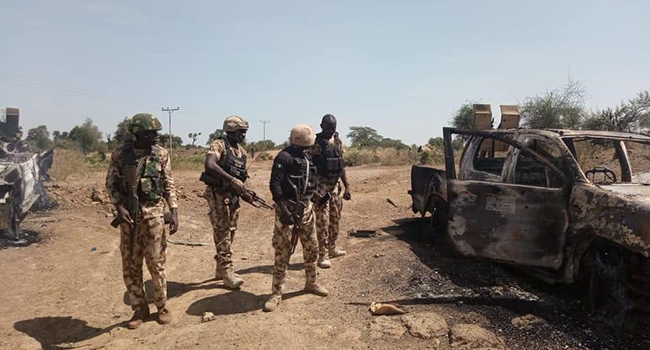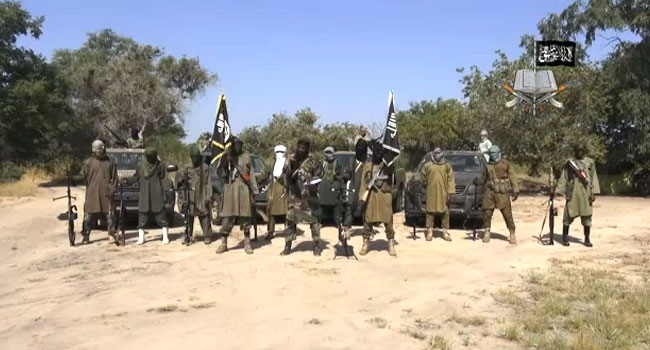Latest report from the Global Terrorism Index (GTI) has shown that Nigeria moved to 8th position, moving down two steps from its place in 2022, an indication that the nation’s ranking has improved.
The report which is published annually by the Institute for Economics and Peace (IEP), provides a comprehensive summary of the key global trends and patterns in terrorism since 2000, and attempts to systematically rank countries according to terrorist activities.
According to the index for 2023, a continuous decline in the number of deaths from terrorism has seen Nigeria move down the ladder of nations most impacted by terrorists.
In the Sub-Saharan region, Ethiopia was the most improved country in 2022,
with the country continuing to record zero terrorism-related deaths for the sixth consecutive year. Al-Shabaab were responsible for two attacks in Ethiopia in 2022, however no deaths were recorded.
READ ALSO: Police Summon Ihedioha, Ugochinyere-Imo Over Murder, Kidnapping And Arson
Nigeria recorded the largest decrease in the number deaths from terrorism in the region in 2022. Deaths fell by almost a quarter, from 497 in 2021 to 385 in 2022, and are now at their lowest level in Nigeria since 2011.
This fall in deaths was driven by a marked decrease in deaths attributed to ISWA,
with the group being responsible for 57 attacks in 2022, compared to 79 in 2021
The GTI further disclosed that the spatial dynamics of terrorism have changed over the last two years in the Sahel.
“Previously, northeastern Nigeria along with Chad, Cameroon and Niger was the epicentre of terrorist activity, with ISWA and Boko Haram responsible for most of this.
“Since 2020, deaths from terrorism have declined in Nigeria’s Borno State and the neighbouring areas of Chad, Niger and Cameroon.”
However, there are indications that terrorism’s spatial dynamics in the Sahel are shifting from northeastern Nigeria to the tri-border area of Mali, Burkina Faso and Niger and this marks the further trans-nationalisation of terrorism across
the Sahel, and beyond to coastal West Africa.
“Groups like IS and JNIM are also seeking safe havens and new theatres of
operations. Many of these new areas are demographically, economically and ecologically similar to regions in Mali, Nigeria, Burkina Faso and elsewhere, from which jihadi groups initially emerged over a decade ago.
“This trend is not uniform but, as Niger and Nigeria both recorded improvements in their scores. Other Sahelian states such as Mauritania, Senegal and the Gambia continue to experience little-to-no terrorism”.
Meanwhile deaths have rapidly intensified in the tri-border regions of Mali, Burkina Faso and Niger (also known as Liptako-Gourma), driven by the growth of IS affiliates and JNIM. Between 2012 and 2022 Mali, Burkina Faso and Niger became the epicenter of Sahelian terrorism.
Prior to this, deaths in Nigeria peaked in 2014 at 2,101 deaths before declining in five of the subsequent nine years. After recording 865 deaths in 2020, deaths from terrorism in Nigeria decreased by 43 per cent in 2021 and 35 per cent in
2022.
While things seem to have improved in Nigeria, still experts say the country faces a significant threat posed by armed extremist groups such as Boko Haram and ISWA.
Boko Haram’s decline has resulted in a substantial improvement in terrorism in Borno State, which experienced a decrease of 12 per cent in terrorism-related deaths when compared with the year prior. Attacks in the state also decreased from 91 to 48 respectively, a decrease of 47 per cent.
ISWA is now the most prominent group in Borno State, recording 40 incidents that resulted in 168 deaths in 2022, compared to Boko Haram’s six incidents and 63 deaths. The state, however, remains the hardest-hit region in Nigeria for terrorism, accounting for 60 per cent of all terror-related deaths in 2022.
The deadliest terror attack of the year occurred in Borno State, when gunmen killed 50 civilians who were accused of informing on the terrorists’ movements to security forces. ISWA claimed responsibility for the attack, saying it had targeted ‘spies’.
The GTI notes that the conflict between ISWA and Boko Haram that culminated in
the death of Boko Haram leader Abubakar Shekau in May 2021, continued into 2022. Severe defeats, mass defections of operatives to ISWA, as well as counter-terrorism efforts by the Nigerian government and foreign military forces, have
significantly weakened Boko Haram’s impact in Nigeria.
As a result, ISWA has become significantly stronger and continues to expand its area of activity in north-eastern Nigeria and the Lake Chad region. Activity by terrorist groups such as ISWA is expected to increase in the lead up to, and following, February’s presidential elections, as groups exploit tensions caused by the elections.




